Comparative Analysis: Hope and Speculative Anthropology in Three Books
VerifiedAdded on 2022/12/14
|6
|1472
|381
Essay
AI Summary
This essay provides a comparative review of three books within the discipline of anthropology: Hirokazu Miyazaki's "The Method of Hope," Graham M. Jones' "Magic's Reason," and Valerie Olson's "Into the Extreme." The essay examines how each book addresses themes of hope and speculative anthropology in the contemporary context. Miyazaki's work explores the struggle of the Suvavou people for justice, highlighting the role of hope in their pursuit and its relevance for other indigenous communities. Jones's book analyzes the role of magic and its relationship to modernity, while Olson's work examines the US's control over outer space. The essay compares the books' perspectives on hope and speculative anthropology, including how each author envisions future developments and societal impacts, discussing the potential for positive and negative outcomes. The analysis considers the interplay of cultural practices, technological advancements, and political dynamics.
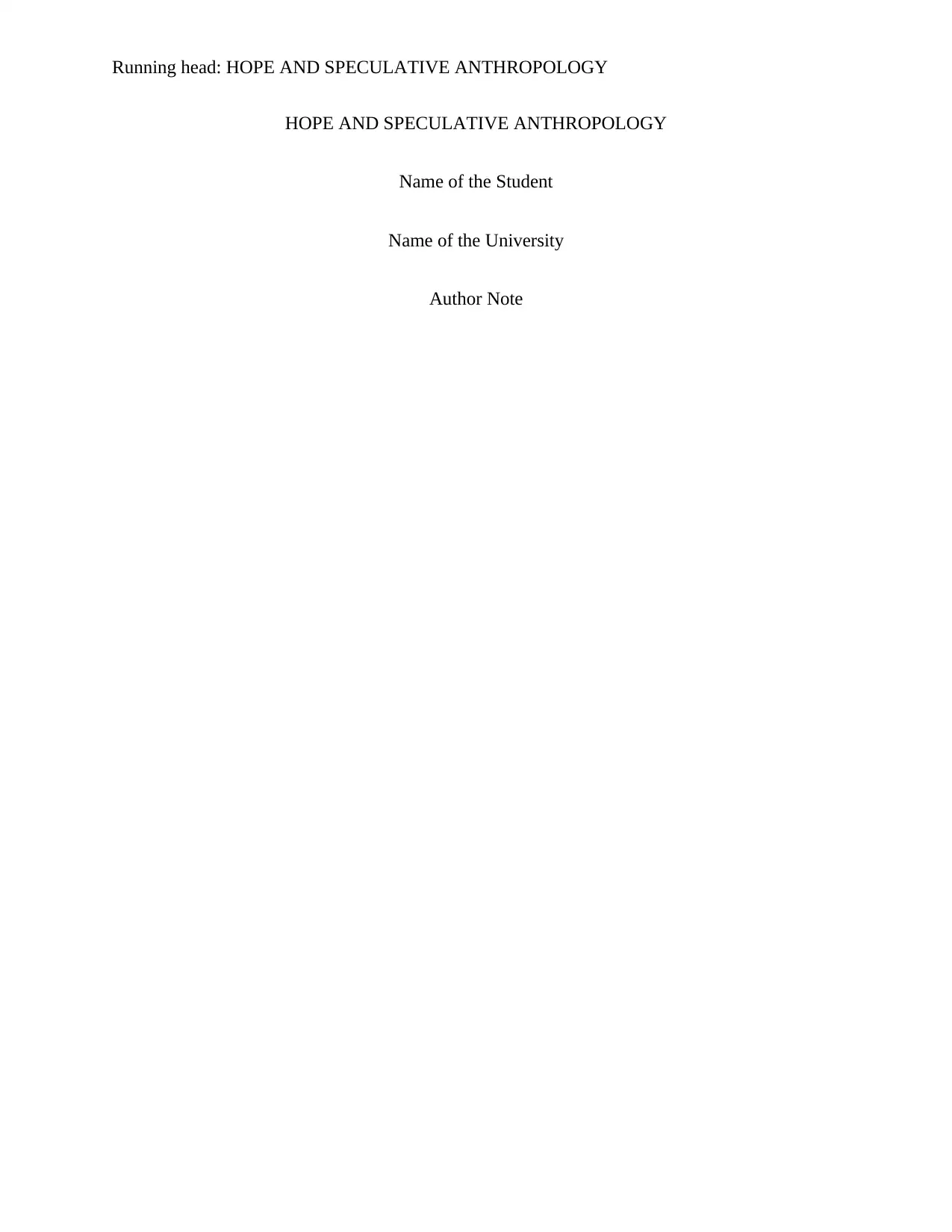
Running head: HOPE AND SPECULATIVE ANTHROPOLOGY
HOPE AND SPECULATIVE ANTHROPOLOGY
Name of the Student
Name of the University
Author Note
HOPE AND SPECULATIVE ANTHROPOLOGY
Name of the Student
Name of the University
Author Note
Paraphrase This Document
Need a fresh take? Get an instant paraphrase of this document with our AI Paraphraser
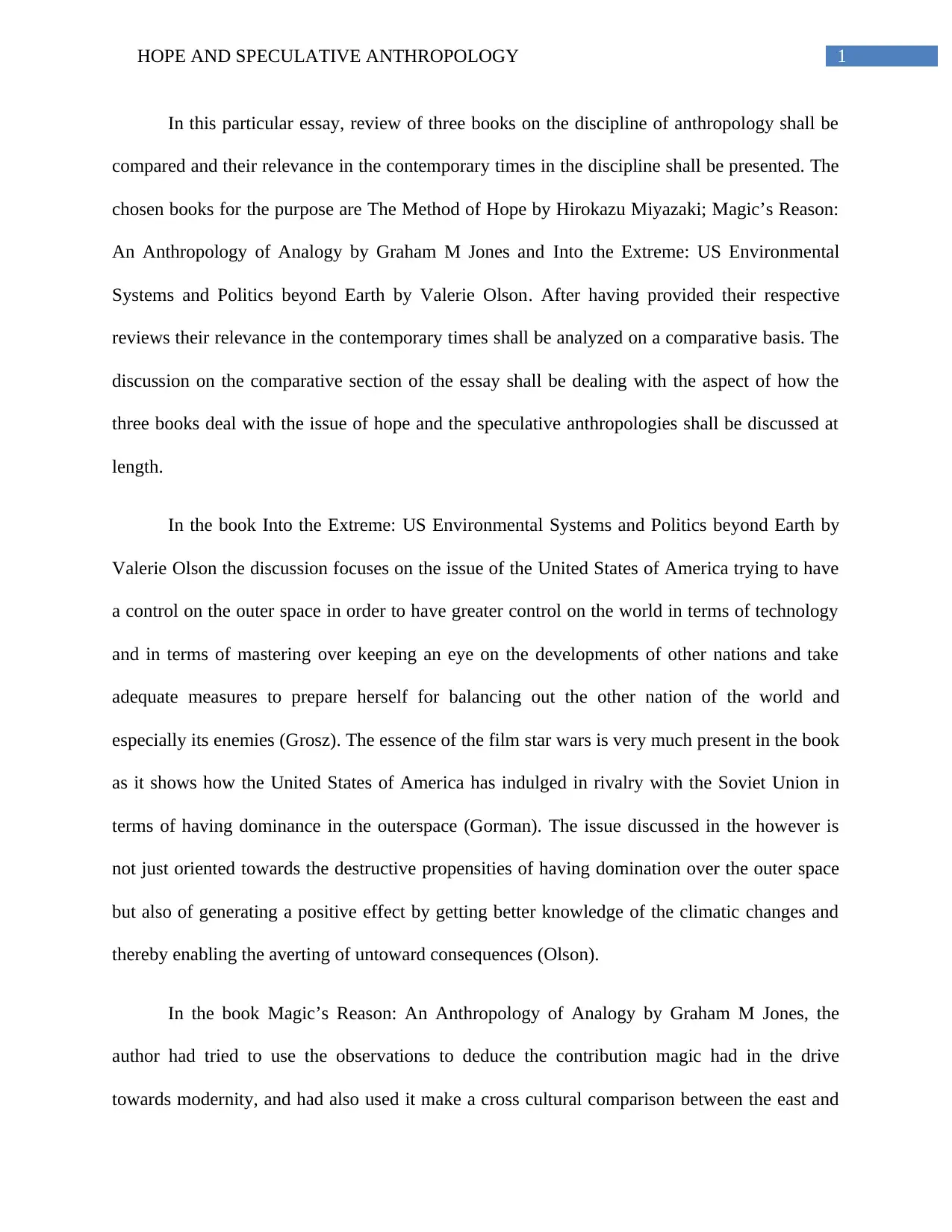
1HOPE AND SPECULATIVE ANTHROPOLOGY
In this particular essay, review of three books on the discipline of anthropology shall be
compared and their relevance in the contemporary times in the discipline shall be presented. The
chosen books for the purpose are The Method of Hope by Hirokazu Miyazaki; Magic’s Reason:
An Anthropology of Analogy by Graham M Jones and Into the Extreme: US Environmental
Systems and Politics beyond Earth by Valerie Olson. After having provided their respective
reviews their relevance in the contemporary times shall be analyzed on a comparative basis. The
discussion on the comparative section of the essay shall be dealing with the aspect of how the
three books deal with the issue of hope and the speculative anthropologies shall be discussed at
length.
In the book Into the Extreme: US Environmental Systems and Politics beyond Earth by
Valerie Olson the discussion focuses on the issue of the United States of America trying to have
a control on the outer space in order to have greater control on the world in terms of technology
and in terms of mastering over keeping an eye on the developments of other nations and take
adequate measures to prepare herself for balancing out the other nation of the world and
especially its enemies (Grosz). The essence of the film star wars is very much present in the book
as it shows how the United States of America has indulged in rivalry with the Soviet Union in
terms of having dominance in the outerspace (Gorman). The issue discussed in the however is
not just oriented towards the destructive propensities of having domination over the outer space
but also of generating a positive effect by getting better knowledge of the climatic changes and
thereby enabling the averting of untoward consequences (Olson).
In the book Magic’s Reason: An Anthropology of Analogy by Graham M Jones, the
author had tried to use the observations to deduce the contribution magic had in the drive
towards modernity, and had also used it make a cross cultural comparison between the east and
In this particular essay, review of three books on the discipline of anthropology shall be
compared and their relevance in the contemporary times in the discipline shall be presented. The
chosen books for the purpose are The Method of Hope by Hirokazu Miyazaki; Magic’s Reason:
An Anthropology of Analogy by Graham M Jones and Into the Extreme: US Environmental
Systems and Politics beyond Earth by Valerie Olson. After having provided their respective
reviews their relevance in the contemporary times shall be analyzed on a comparative basis. The
discussion on the comparative section of the essay shall be dealing with the aspect of how the
three books deal with the issue of hope and the speculative anthropologies shall be discussed at
length.
In the book Into the Extreme: US Environmental Systems and Politics beyond Earth by
Valerie Olson the discussion focuses on the issue of the United States of America trying to have
a control on the outer space in order to have greater control on the world in terms of technology
and in terms of mastering over keeping an eye on the developments of other nations and take
adequate measures to prepare herself for balancing out the other nation of the world and
especially its enemies (Grosz). The essence of the film star wars is very much present in the book
as it shows how the United States of America has indulged in rivalry with the Soviet Union in
terms of having dominance in the outerspace (Gorman). The issue discussed in the however is
not just oriented towards the destructive propensities of having domination over the outer space
but also of generating a positive effect by getting better knowledge of the climatic changes and
thereby enabling the averting of untoward consequences (Olson).
In the book Magic’s Reason: An Anthropology of Analogy by Graham M Jones, the
author had tried to use the observations to deduce the contribution magic had in the drive
towards modernity, and had also used it make a cross cultural comparison between the east and
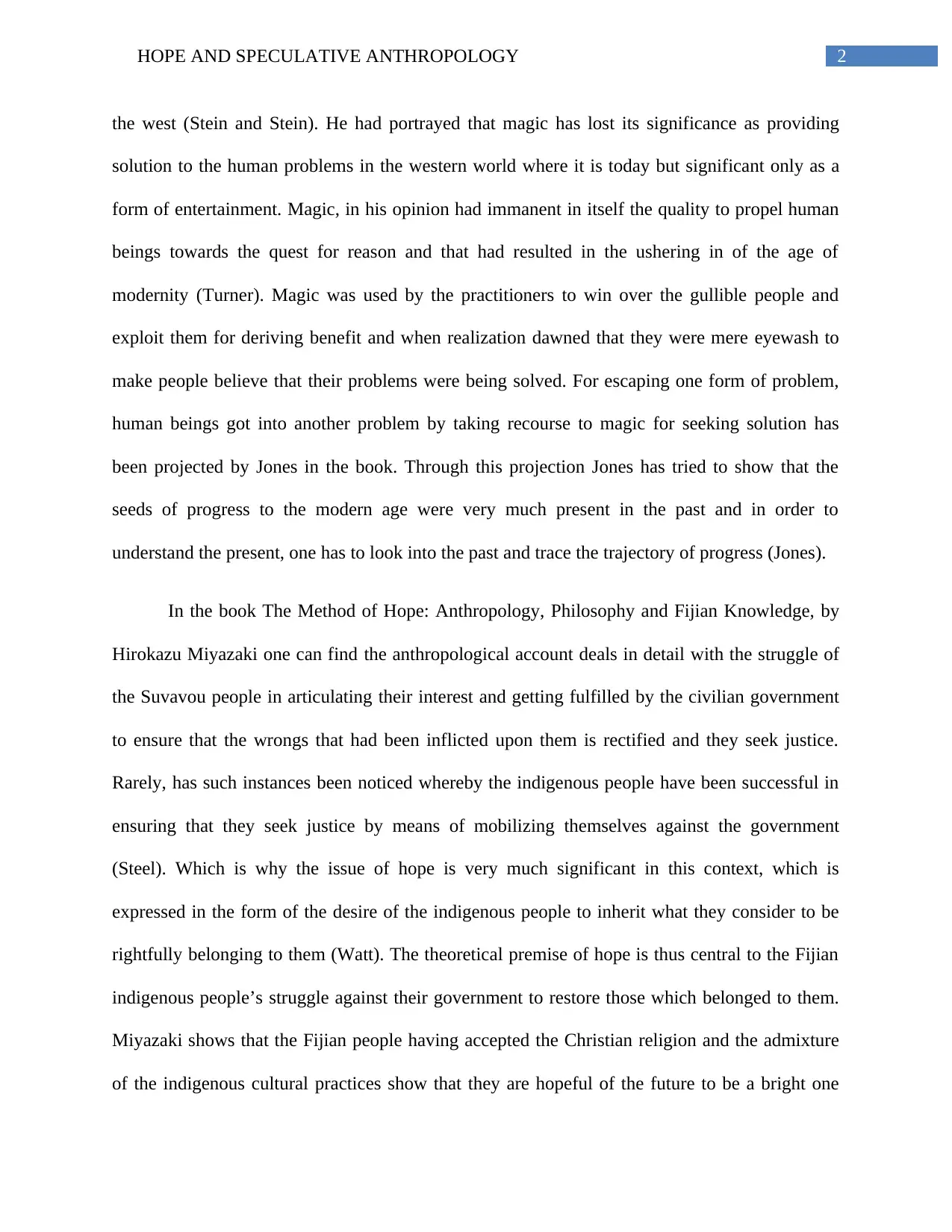
2HOPE AND SPECULATIVE ANTHROPOLOGY
the west (Stein and Stein). He had portrayed that magic has lost its significance as providing
solution to the human problems in the western world where it is today but significant only as a
form of entertainment. Magic, in his opinion had immanent in itself the quality to propel human
beings towards the quest for reason and that had resulted in the ushering in of the age of
modernity (Turner). Magic was used by the practitioners to win over the gullible people and
exploit them for deriving benefit and when realization dawned that they were mere eyewash to
make people believe that their problems were being solved. For escaping one form of problem,
human beings got into another problem by taking recourse to magic for seeking solution has
been projected by Jones in the book. Through this projection Jones has tried to show that the
seeds of progress to the modern age were very much present in the past and in order to
understand the present, one has to look into the past and trace the trajectory of progress (Jones).
In the book The Method of Hope: Anthropology, Philosophy and Fijian Knowledge, by
Hirokazu Miyazaki one can find the anthropological account deals in detail with the struggle of
the Suvavou people in articulating their interest and getting fulfilled by the civilian government
to ensure that the wrongs that had been inflicted upon them is rectified and they seek justice.
Rarely, has such instances been noticed whereby the indigenous people have been successful in
ensuring that they seek justice by means of mobilizing themselves against the government
(Steel). Which is why the issue of hope is very much significant in this context, which is
expressed in the form of the desire of the indigenous people to inherit what they consider to be
rightfully belonging to them (Watt). The theoretical premise of hope is thus central to the Fijian
indigenous people’s struggle against their government to restore those which belonged to them.
Miyazaki shows that the Fijian people having accepted the Christian religion and the admixture
of the indigenous cultural practices show that they are hopeful of the future to be a bright one
the west (Stein and Stein). He had portrayed that magic has lost its significance as providing
solution to the human problems in the western world where it is today but significant only as a
form of entertainment. Magic, in his opinion had immanent in itself the quality to propel human
beings towards the quest for reason and that had resulted in the ushering in of the age of
modernity (Turner). Magic was used by the practitioners to win over the gullible people and
exploit them for deriving benefit and when realization dawned that they were mere eyewash to
make people believe that their problems were being solved. For escaping one form of problem,
human beings got into another problem by taking recourse to magic for seeking solution has
been projected by Jones in the book. Through this projection Jones has tried to show that the
seeds of progress to the modern age were very much present in the past and in order to
understand the present, one has to look into the past and trace the trajectory of progress (Jones).
In the book The Method of Hope: Anthropology, Philosophy and Fijian Knowledge, by
Hirokazu Miyazaki one can find the anthropological account deals in detail with the struggle of
the Suvavou people in articulating their interest and getting fulfilled by the civilian government
to ensure that the wrongs that had been inflicted upon them is rectified and they seek justice.
Rarely, has such instances been noticed whereby the indigenous people have been successful in
ensuring that they seek justice by means of mobilizing themselves against the government
(Steel). Which is why the issue of hope is very much significant in this context, which is
expressed in the form of the desire of the indigenous people to inherit what they consider to be
rightfully belonging to them (Watt). The theoretical premise of hope is thus central to the Fijian
indigenous people’s struggle against their government to restore those which belonged to them.
Miyazaki shows that the Fijian people having accepted the Christian religion and the admixture
of the indigenous cultural practices show that they are hopeful of the future to be a bright one
⊘ This is a preview!⊘
Do you want full access?
Subscribe today to unlock all pages.

Trusted by 1+ million students worldwide
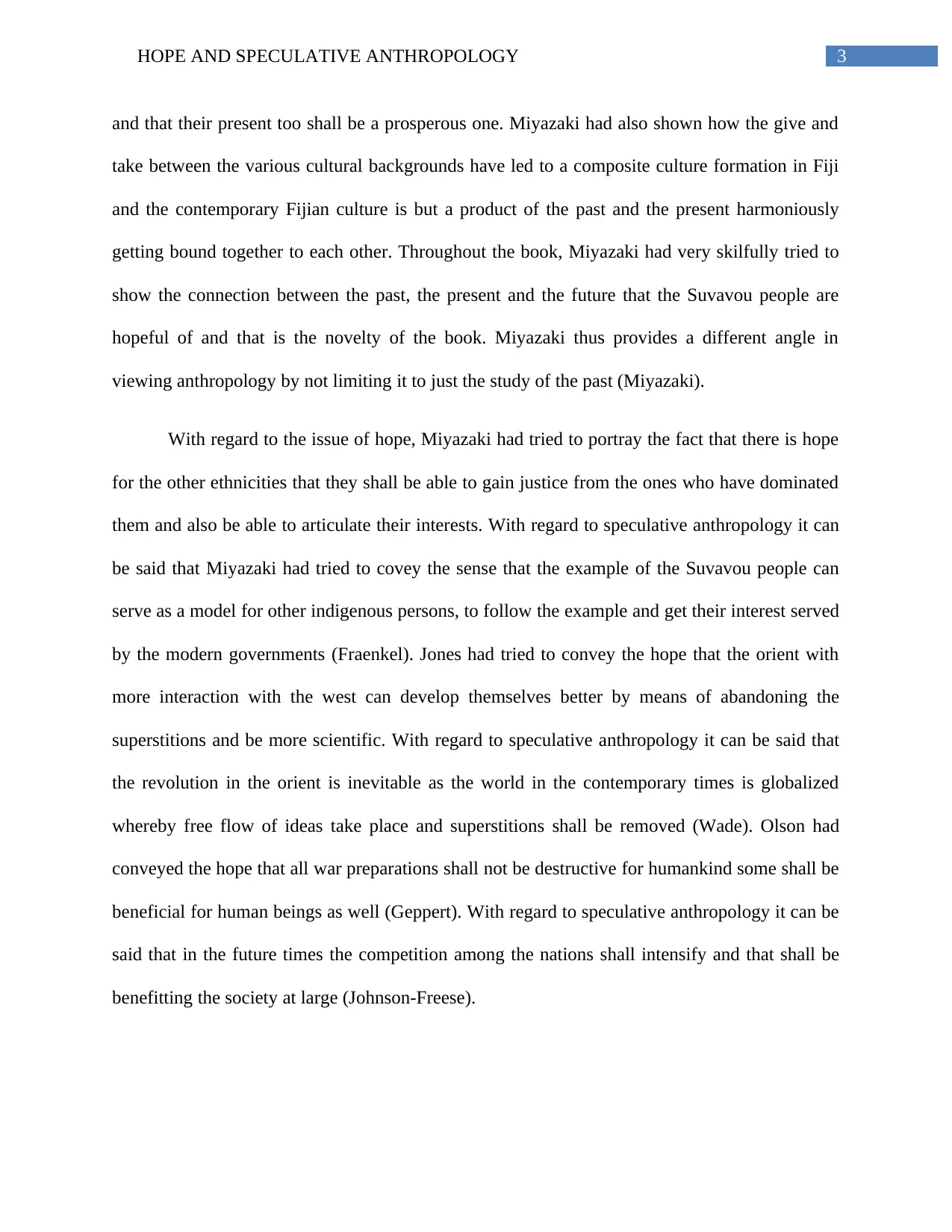
3HOPE AND SPECULATIVE ANTHROPOLOGY
and that their present too shall be a prosperous one. Miyazaki had also shown how the give and
take between the various cultural backgrounds have led to a composite culture formation in Fiji
and the contemporary Fijian culture is but a product of the past and the present harmoniously
getting bound together to each other. Throughout the book, Miyazaki had very skilfully tried to
show the connection between the past, the present and the future that the Suvavou people are
hopeful of and that is the novelty of the book. Miyazaki thus provides a different angle in
viewing anthropology by not limiting it to just the study of the past (Miyazaki).
With regard to the issue of hope, Miyazaki had tried to portray the fact that there is hope
for the other ethnicities that they shall be able to gain justice from the ones who have dominated
them and also be able to articulate their interests. With regard to speculative anthropology it can
be said that Miyazaki had tried to covey the sense that the example of the Suvavou people can
serve as a model for other indigenous persons, to follow the example and get their interest served
by the modern governments (Fraenkel). Jones had tried to convey the hope that the orient with
more interaction with the west can develop themselves better by means of abandoning the
superstitions and be more scientific. With regard to speculative anthropology it can be said that
the revolution in the orient is inevitable as the world in the contemporary times is globalized
whereby free flow of ideas take place and superstitions shall be removed (Wade). Olson had
conveyed the hope that all war preparations shall not be destructive for humankind some shall be
beneficial for human beings as well (Geppert). With regard to speculative anthropology it can be
said that in the future times the competition among the nations shall intensify and that shall be
benefitting the society at large (Johnson-Freese).
and that their present too shall be a prosperous one. Miyazaki had also shown how the give and
take between the various cultural backgrounds have led to a composite culture formation in Fiji
and the contemporary Fijian culture is but a product of the past and the present harmoniously
getting bound together to each other. Throughout the book, Miyazaki had very skilfully tried to
show the connection between the past, the present and the future that the Suvavou people are
hopeful of and that is the novelty of the book. Miyazaki thus provides a different angle in
viewing anthropology by not limiting it to just the study of the past (Miyazaki).
With regard to the issue of hope, Miyazaki had tried to portray the fact that there is hope
for the other ethnicities that they shall be able to gain justice from the ones who have dominated
them and also be able to articulate their interests. With regard to speculative anthropology it can
be said that Miyazaki had tried to covey the sense that the example of the Suvavou people can
serve as a model for other indigenous persons, to follow the example and get their interest served
by the modern governments (Fraenkel). Jones had tried to convey the hope that the orient with
more interaction with the west can develop themselves better by means of abandoning the
superstitions and be more scientific. With regard to speculative anthropology it can be said that
the revolution in the orient is inevitable as the world in the contemporary times is globalized
whereby free flow of ideas take place and superstitions shall be removed (Wade). Olson had
conveyed the hope that all war preparations shall not be destructive for humankind some shall be
beneficial for human beings as well (Geppert). With regard to speculative anthropology it can be
said that in the future times the competition among the nations shall intensify and that shall be
benefitting the society at large (Johnson-Freese).
Paraphrase This Document
Need a fresh take? Get an instant paraphrase of this document with our AI Paraphraser
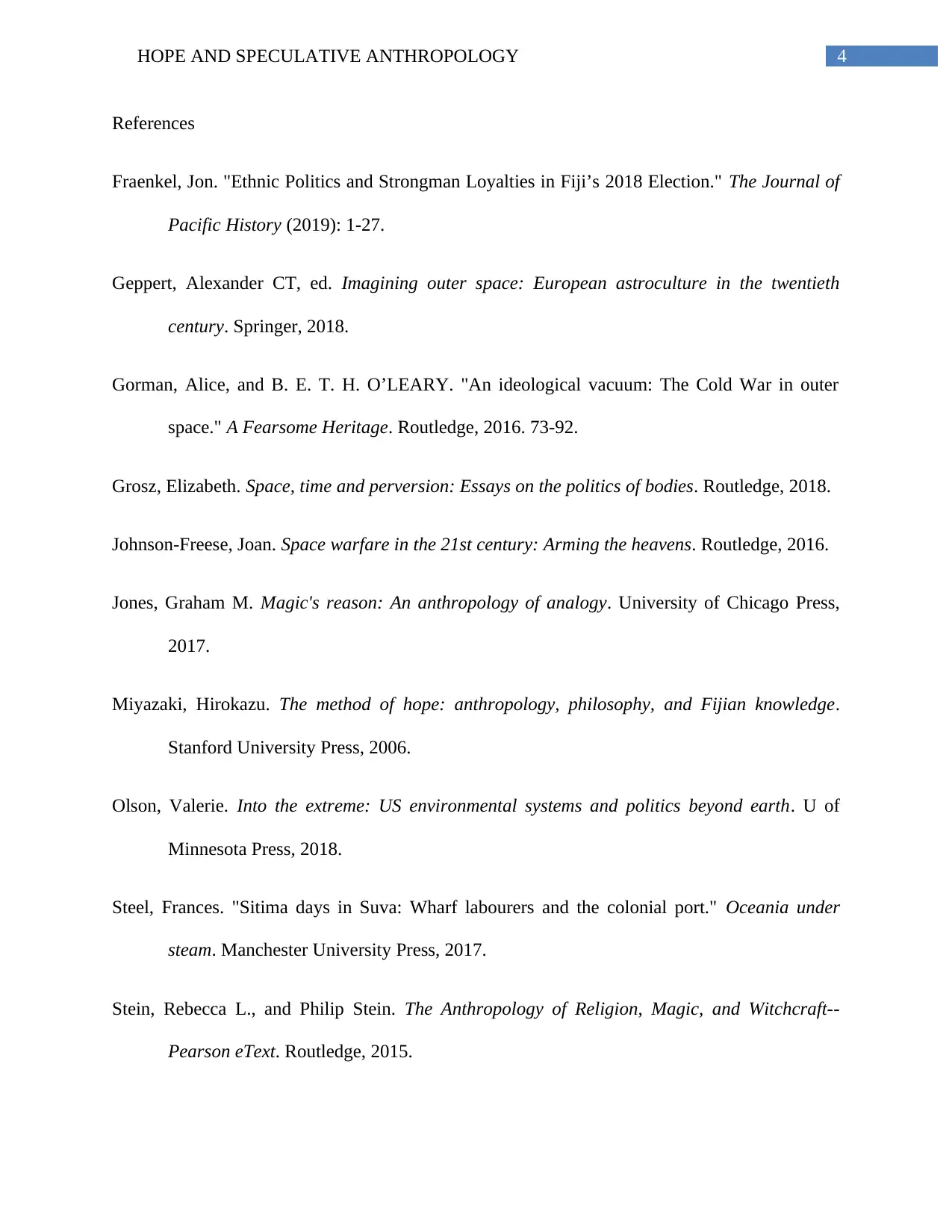
4HOPE AND SPECULATIVE ANTHROPOLOGY
References
Fraenkel, Jon. "Ethnic Politics and Strongman Loyalties in Fiji’s 2018 Election." The Journal of
Pacific History (2019): 1-27.
Geppert, Alexander CT, ed. Imagining outer space: European astroculture in the twentieth
century. Springer, 2018.
Gorman, Alice, and B. E. T. H. O’LEARY. "An ideological vacuum: The Cold War in outer
space." A Fearsome Heritage. Routledge, 2016. 73-92.
Grosz, Elizabeth. Space, time and perversion: Essays on the politics of bodies. Routledge, 2018.
Johnson-Freese, Joan. Space warfare in the 21st century: Arming the heavens. Routledge, 2016.
Jones, Graham M. Magic's reason: An anthropology of analogy. University of Chicago Press,
2017.
Miyazaki, Hirokazu. The method of hope: anthropology, philosophy, and Fijian knowledge.
Stanford University Press, 2006.
Olson, Valerie. Into the extreme: US environmental systems and politics beyond earth. U of
Minnesota Press, 2018.
Steel, Frances. "Sitima days in Suva: Wharf labourers and the colonial port." Oceania under
steam. Manchester University Press, 2017.
Stein, Rebecca L., and Philip Stein. The Anthropology of Religion, Magic, and Witchcraft--
Pearson eText. Routledge, 2015.
References
Fraenkel, Jon. "Ethnic Politics and Strongman Loyalties in Fiji’s 2018 Election." The Journal of
Pacific History (2019): 1-27.
Geppert, Alexander CT, ed. Imagining outer space: European astroculture in the twentieth
century. Springer, 2018.
Gorman, Alice, and B. E. T. H. O’LEARY. "An ideological vacuum: The Cold War in outer
space." A Fearsome Heritage. Routledge, 2016. 73-92.
Grosz, Elizabeth. Space, time and perversion: Essays on the politics of bodies. Routledge, 2018.
Johnson-Freese, Joan. Space warfare in the 21st century: Arming the heavens. Routledge, 2016.
Jones, Graham M. Magic's reason: An anthropology of analogy. University of Chicago Press,
2017.
Miyazaki, Hirokazu. The method of hope: anthropology, philosophy, and Fijian knowledge.
Stanford University Press, 2006.
Olson, Valerie. Into the extreme: US environmental systems and politics beyond earth. U of
Minnesota Press, 2018.
Steel, Frances. "Sitima days in Suva: Wharf labourers and the colonial port." Oceania under
steam. Manchester University Press, 2017.
Stein, Rebecca L., and Philip Stein. The Anthropology of Religion, Magic, and Witchcraft--
Pearson eText. Routledge, 2015.
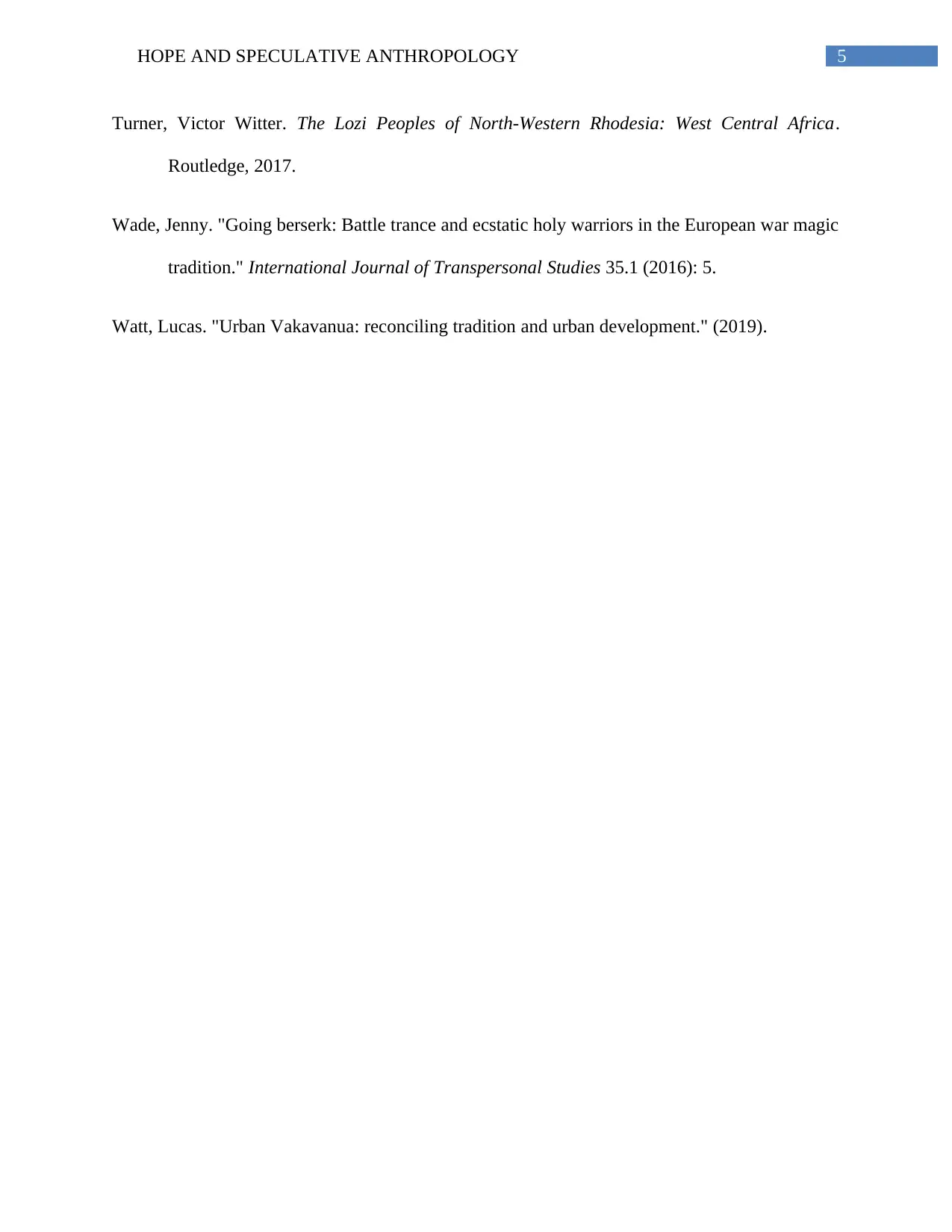
5HOPE AND SPECULATIVE ANTHROPOLOGY
Turner, Victor Witter. The Lozi Peoples of North-Western Rhodesia: West Central Africa.
Routledge, 2017.
Wade, Jenny. "Going berserk: Battle trance and ecstatic holy warriors in the European war magic
tradition." International Journal of Transpersonal Studies 35.1 (2016): 5.
Watt, Lucas. "Urban Vakavanua: reconciling tradition and urban development." (2019).
Turner, Victor Witter. The Lozi Peoples of North-Western Rhodesia: West Central Africa.
Routledge, 2017.
Wade, Jenny. "Going berserk: Battle trance and ecstatic holy warriors in the European war magic
tradition." International Journal of Transpersonal Studies 35.1 (2016): 5.
Watt, Lucas. "Urban Vakavanua: reconciling tradition and urban development." (2019).
⊘ This is a preview!⊘
Do you want full access?
Subscribe today to unlock all pages.

Trusted by 1+ million students worldwide
1 out of 6
Related Documents
Your All-in-One AI-Powered Toolkit for Academic Success.
+13062052269
info@desklib.com
Available 24*7 on WhatsApp / Email
![[object Object]](/_next/static/media/star-bottom.7253800d.svg)
Unlock your academic potential
Copyright © 2020–2026 A2Z Services. All Rights Reserved. Developed and managed by ZUCOL.




